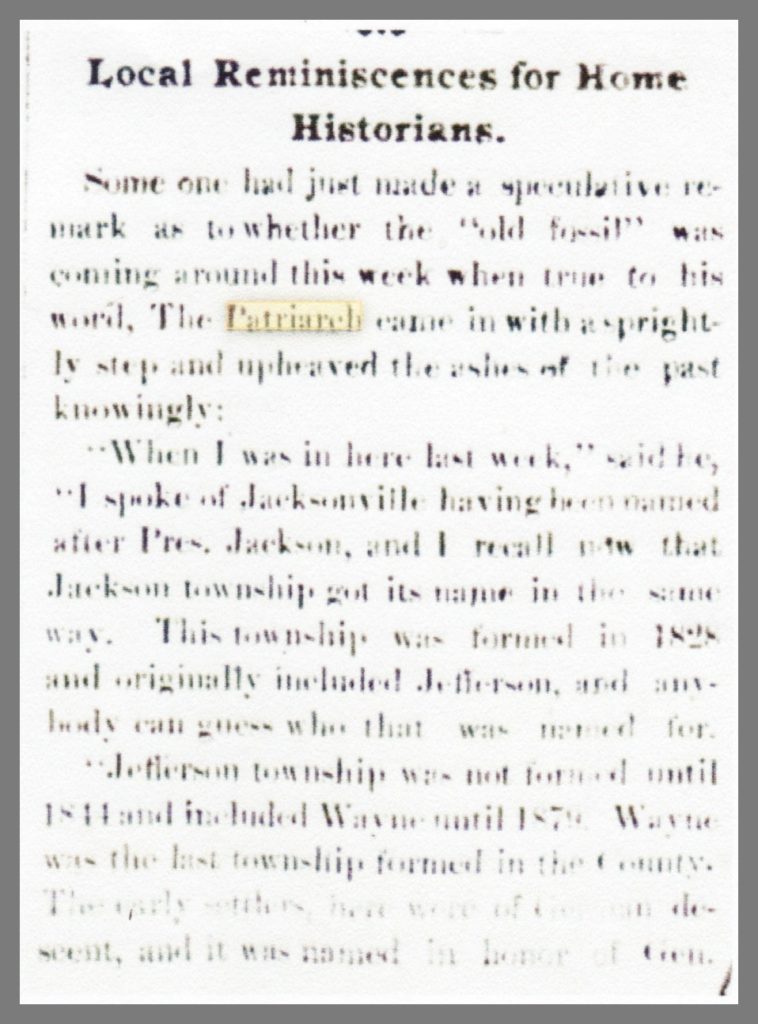Seventh in a series of nine 1904-1905 newspaper articles in which two old-timers are portrayed reminiscing about the Lykens Valley of the past. The two fictional characters, the “old railroader” and the “patriarch,” wander into the offices of the Elizabethville Echo, Elizabethville, Dauphin County, Pennsylvania at different times and tell a concise, folksy history of the valley.
_____________________________________
Local Reminiscences for Home Historians
Some one had just made a speculative remark as to whether the “old fossil” was coming around this week when true to his word, The Patriarch came in with a sprightly step and upheaved the ashes of the past knowingly:
“When I was in here last week,” said he, “I spoke of Jacksonville having been named after President Jackson, and I recall now that Jackson Township got its name in the same way. This township was formed in 1828 and originally included Jefferson and anybody can guess who that was named for.
“Jefferson Township was for formed until 1844 and included Wayne until 1879. Wayne Township was the last township formed in the county. The early settlers here were of a German descent, and was named in honor of Gen. Anthony Wayne. in 1855 Jonathan Enterline opened a store in that section and when a post-office was established there, he was the first incumbent and the place was named for him. The first church there was the Reformed, which was built in 1838.
“Jefferson Township has a post-office at Carsonville, and not many miles from that village, on one of the old trails, there are remains of old Shawanese Indian camps and burying grounds.
“There there is another fine country town down Armstrong Valley, that I didn’t get to last week. In 1854, Major George Fisher laid out the plot of ground where Fisherville now stands and some folks may not know that this town was once spoken of more prominently than any other place in the State.
“Yes indeedy, it was in the Thirty-Eighth Congress, when Washingotn, the Nation’s Capital, was considered a dangerous place, one of the most eminent men of that period got up and suggested Fisherville as a safe location for the seat of government. There was great alarm in these days, as older heads well know, and it was mostly for the fact that Fisherville was not known abroad before that time, that the suggestion did not get serious consideration.
“Well, now, who hasn’t heard about Rush Township? Why, it figures in our earliest history, and gave the world at least one great character, though little can be recalled about him owing to his untimely death. But Rush Township was formed in 1819, and was named for Benjamin Rush, a signer of the Declaration of Independence. It has fewer inhabitants than any other township in the county.
“Coming back to our own valley, Curtin, over here, was named for Andrew G. Curtin, Pennsylvania’s great was Governor, and Rife was so called for ex-Congressman Rife of Middletown.
“And that reminds me, do you now that in the old, neglected graveyard of the stone church which now seems to have been abandoned by everybody, one of the best men that ever held a seat in the Pennsylvania legislature lies beneath a crumbling tombstone – “and none to do him reverence!”
The Patriarch will tell of him next week.
___________________________________
From the Elizabethville Echo, 2 February 1905.
Corrections and additional information should be added as comments to this post.
[Indians]
